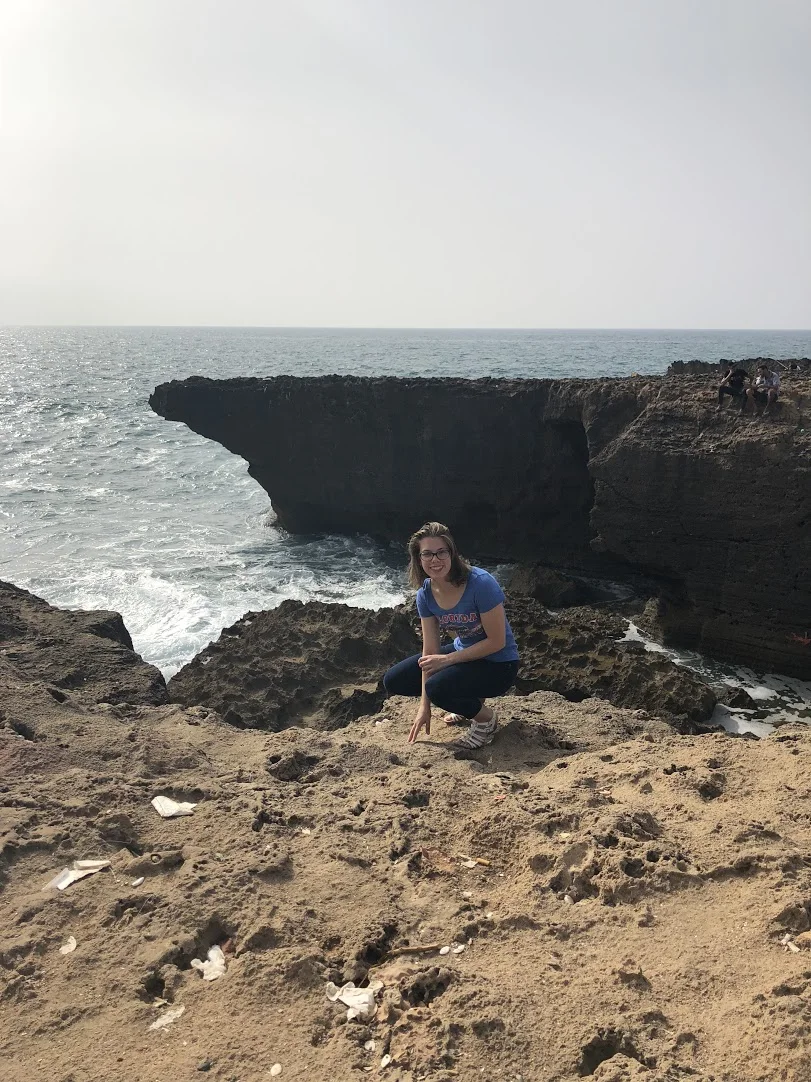"Zawiya Ahansal" by Gwenyth Szabo
When people think of the most popular places to go in Morocco, of course the famous cities come to mind: Rabat, Casablanca, Tangier, Marrakech… but most people do not usually think to visit the small rural villages, where Amazigh or Berber culture is vibrant and thriving. Situated several hours outside of Marrakech is a small village called Zawiya Ahansal. The inhabitants are Amazigh and speak the local Berber language as their primary language of communication, in addition to Moroccan Arabic.
The beautiful city of Zawiya Ahansal located in the Atlas Mountains. Photo Credit: G. Szabo, Fall 2018
AMIDEAST has a very close relationship with the village and sends students to Zawiya Ahansal every semester. When we arrived at the village, we were warmly welcomed by the Sheikh and his family, who permitted us to stay in their guest house. The Sheikh is the political representative of the village, so he and the other village Sheikhs often meet with the state to express the villages’ desires and represent their voices on multiple issues. The Sheikh is an appointed position by the people in the village with the approval of the government. We had the opportunity to share tea with the Sheikh and ask him about his role in the village. He discussed how he handles minor disputes between people in the village and has the responsibility of approving marriage contracts.
The Sheikh’s guest house and dining table where we shared meals. Photo Credit: G. Szabo, Fall 2018
We also learned about the various projects in the village and how several NGOs are active in the community. The Atlas Culture Foundation (ACF) is one of the most active NGOs, working on education and architecture restoration. Our group met with Chloe, one of the NGO’s leaders, who explained how the NGO regularly meets with the village members to implement projects requested by the people. For example, ACF started a tutoring program that drastically increased Zawiya students’ state test scores. They also introduced the first women´s health workshop. Our group had the chance to contribute to the tutoring program by launching the first tutoring session of the year. The group split into different sections to teach math, English, crafts, and drawing to young students. Their enthusiasm made it an absolute pleasure to teach them and I was impressed by how quickly they grasped the language.
Unfortunately, traveling to school is very difficult in the Atlas Mountains. Some students must walk up to 30 minutes on unpaved roads along the edge of steep ravines to get to school. The ACF has been working to build boarding schools and provide school buses for students to commute safely. Because of the NGO´s efforts, more kids complete high school and are going to university.
The Atlas Culture Foundation’s next project, per the request of the community, is to build a community center in this area where the architecture is deteriorating. Photo Credit: G. Szabo, Fall 2018
While ACF is a Western-based NGO, the founders of another NGO we visited were a group of Zawiya natives who went to university, researched the best methods to provide clean water to the village, and returned to implement their plan. The group established indoor plumbing throughout the village by providing chlorine treatment to water from springs higher up in the mountains. They partner with other organizations, such as ACF, to provide cleaning stations for washing clothing and bedding, rather than cleaning in the river and causing pollution. Initially, the people did not trust the plumbing and taxes associated with it but after seeing the benefits, the program was implemented and widespread.
It was amazing to learn about Zawiya culture and stay with the Sheikh´s family. My favorite part of the trip was on the final night. After a delicious meal with the family and guides, the entire group dressed in traditional Moroccan outfits and danced to traditional Berber music. This experience was unforgettable and it has been one of the highlights of my time in Morocco so far.
I had the privilege of wearing a traditional djellaba provided by the Sheikh’s family for dancing and festivities on our final night in the community. Photo Credit: G. Szabo, Fall 2018






